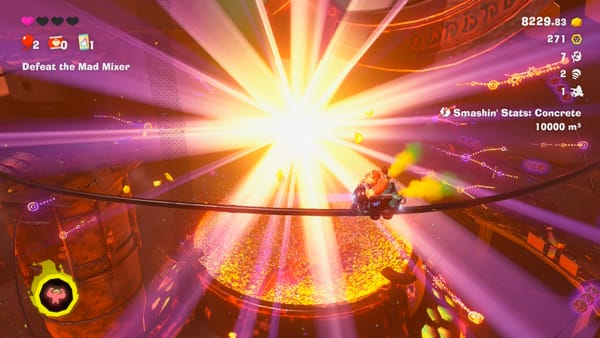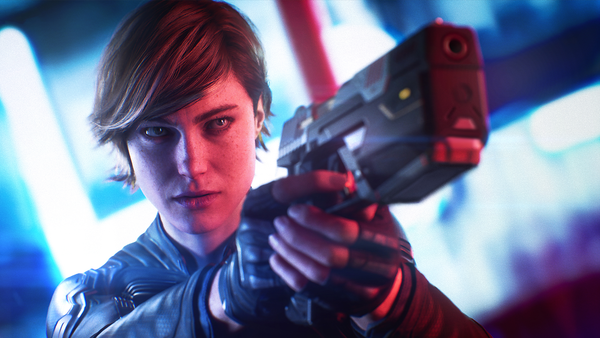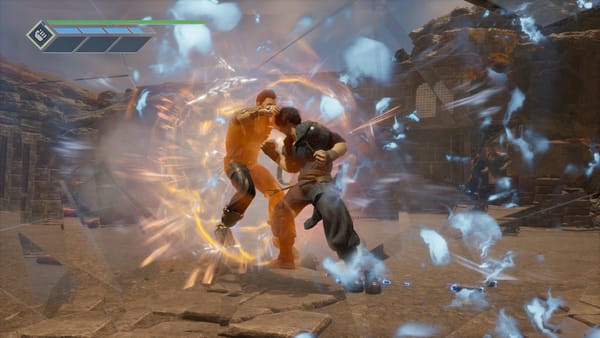#159: Gaming the system
Holding back review code to protect day-one Metascores is a risky business. Still, publishers persist.
Hello, lovely paid subscribers. Here’s your exclusive for the week.
I realise Ragnarok is the big new game of the week, but let us turn for a moment to Sonic Frontiers, which released yesterday and has attracted a simply bonkers range of review scores. On PS5, its Metacritic average is 72, which is pretty good! Seven is a good score, after all (I spent a decade stressing that to disgruntled PRs and developers, and have no intention of stopping now). But feeding into that average are scores as high as 90 and as low as 20. Ironically enough, a spread of scores like this makes me more interested in playing a game than one that scored 7s across the board; anything this divisive has got to be worth checking out.
However, Sega has been accused of being a bit selective with the ol’ review code. In the run-up to release I saw plenty of grumpy Tweets from journos whose outlet had seemingly been passed over when codes were dished out. This has naturally invited suspicion that the publisher wanted to withhold the game from outlets it deemed more likely to be critical, and to hurt its early Metascore.
Is it true? Only Sega truly knows, and in any case I do not think it fair to single the publisher out for it. This has been going on for years, and I’ve seen similar recent grumblings about Harvestella and Modern Warfare II, to name but a couple. I understand the motivation; often, particularly at big companies, a bad set of review scores is blamed on the PR operation, rather than the development one. And hey, I’m sure that sometimes the regional PR department of a multinational company really doesn’t get enough codes to go around, and difficult choices must be made about which outlets get the first batch.
Still, this is a sufficiently regular phenomenon that I figure it’s worth talking about a bit. I completely understand why a company might try to flatter a game’s day-one Metascore — particularly if there are targets or financial incentives involved — but I would strongly caution against it. I’m not sure the potential short-term benefits are worth the problems it can cause down the line.
I do not, generally, think it a good idea to piss off the people who are about to write about your game. I know what it feels like to be left out in the cold, discovering that other outlets have access to a game you’re still waiting for. You message the writer assigned to it, embarrassed to have to admit you’ve been passed over, apologising for having to screw over someone who’s likely had time blocked out in their schedule for you for weeks, turning other commissions down because you asked first. Online editors will fret about whether they can still get something online in time for embargo; we print dinosaurs would wonder whether we’d have to push the review back an issue, and worry about how to fill the newly blank pages. Writers stare down the barrel of a review deadline that was already looking tight, and now seems next to impossible. Bad vibes all round, really.
All that definitely changes the way a critic approaches the game in question. It is simply unavoidable. I am not saying that a reviewer who has been kept waiting is inclined, when code finally arrives, to administer a punishment beating — professional critics leave their prejudices at the door, even when a review involves four straight days of 3am finishes — but some degree of mindset shift is inevitable.
It makes you suspicious from the minute you pick up the controller. It makes you assume that, if other outlets were given code before you, there must be a reason for it. You become, whether consciously or not, more alert to a game’s flaws because the publisher, by failing to give you review code at the first opportunity, has strongly suggested that flaws exist. And if the late review code still arrives within crunchable distance of an embargo lifting, the game may come off even worse. Few games are flattered by being sprinted through, and already troubled games will appear even more so through the repetition, the resentment and the rush.
This is not just a problem for the press, either. I found out about Frontiers review code being held back on Twitter. (I have since asked around a bit to see how widespread a trend it was, and: quite widespread.) Players will find out about this stuff as well — if not from grumpy journo tweets then from outlets publishing stories to explain why they won’t have a review up on time. The air of suspicion, therefore, wafts seamlessly from the press to a game’s potential customers, threatening its launch-day performance regardless of its Metacritic average at the time.
There is a pretty big trade-off here. Protecting a day-one Metascore by cherry-picking outlets that are perceived to be friendly means accepting that the eventual average may be lower than it would have been had you just given everyone review code at the same time1. The most engaged parts of your playerbase will likely hear about it, and end up just as wary of buying the game as late-coming reviewers were of playing it, because they sense shenanigans in the air. In an era where games are intended to have longer tails2, this seems to me to be an unnecessary risk to take. If a game isn’t very good, we’re all going to find out sooner or later. Might as well just rip off the plaster and be done with it.
MAILBAG!
- “I had to smile when I read the phrase ‘consoles aren’t quite there yet’,” writes Roland Austinat in response to Friday’s edition, on how the increasing prevalence of graphics options are slowly turning console players into PC bores. “Have you tried to connect a PS5, PS4 and Xbox One to an LG OLED TV? Setting it up for Dolby Vision and HDR, adjusting the HDR settings every time you tinker with the TV’s brightness and contrast… Then there are audio settings. PCM? Bitstream? Are these the same as on Xbox One, which has even more options? And how do I make sure the console doesn’t boot up whenever I turn on the TV? We’ve already reached the point of no return.” Yes, okay, fair point. I have followed LG C1 calibration guides to the letter and am still terrified I’ve got something wrong. I started Ragnarok last night and the HDR calibration screen put the willies right up me.
- “Totally resonate with the anxiety around settings,” Darcy Driscoll offers in the comments. “The first two hours of any triple-A game are spent hyper-focusing on any frame drops or hiccups and obsessively tinkering the settings back and forth until I’m satisfied. (I’m never satisfied.)” Glad to know I’m not alone. Hit Points is, at its best, a sort of group therapy session. At £4 a month, I’d like to think it’s very competitively priced.
As ever, leave a comment, reply to this email, or hop in the Discord to have your say on today’s edition, or whatever else takes your (vaguely relevant) fancy.
MORE!
- The European Commission has followed the UK’s lead in opening a deeper phase-two investigation of Acquisition Blizzard. It intends to report its findings on March 23, three weeks after the UK regulator publishes its own. A pivotal month, then. Ides of March and all that.
- Nintendo has lowered its full-year forecast for Switch hardware, after sales fell by almost 20% in the first half of the year. Software more than made up the shortfall, however; net profit rose by more than a third thanks to Splatoon 3’s stellar launch and ongoing sales of Nintendo Switch Sports, Mario Kart 8 Deluxe, and that Kirby game I still haven’t got around to. Nintendo also announced a joint venture with DeNA, the company behind its move into mobile gaming — a surprising turn of events given the modest returns it has seen from the app stores to date. Just 3.5% of Nintendo’s revenue in the last six months came from mobile games.
- Intimidatingly hench Take-Two CEO Strauss Zelnick has handwaved away the publisher’s lukewarm financial results, in which quarterly losses widened to $257m despite a 62% surge in revenue. That sounds pretty bad to me, though I of course wouldn’t say so to Zelnick’s face. “That’s not surprising given the economic backdrop and our expectations for the macroeconomy,” he said, presumably with a barely perceptible, yet still vaguely threatening delt flex. “We have the best collection of owned intellectual property in the business.” The company has 87 games (!) slated for release between now and 2025.
- TechRadar’s oral history of Mass Effect is very good indeed.
- What is FIFA doing with its new-found freedom from the EA licence? Blockchain stuff, obviously.
- Oculus founder Palmer Luckey has made a VR headset that can kill you if you die in a game, in homage to Sword Art Online. “The idea of tying your real life to your virtual avatar has always fascinated me,” he wrote in a blog post. “Only the threat of serious consequences can make a game feel real to you and every other person in the game.” The jokes rather write themselves, but hats off to Drude in the Hit Points Discord for the winner: “As opposed to a VR headset that unintentionally destroys a company.” Bravo.
There you go! I will now squeeze in some Ragnarok before the school run. Do join us in the Discord if you’re also playing and fancy a chat about it. Have a grand couple of days, and I’ll see you for the week’s free edition on Friday.





